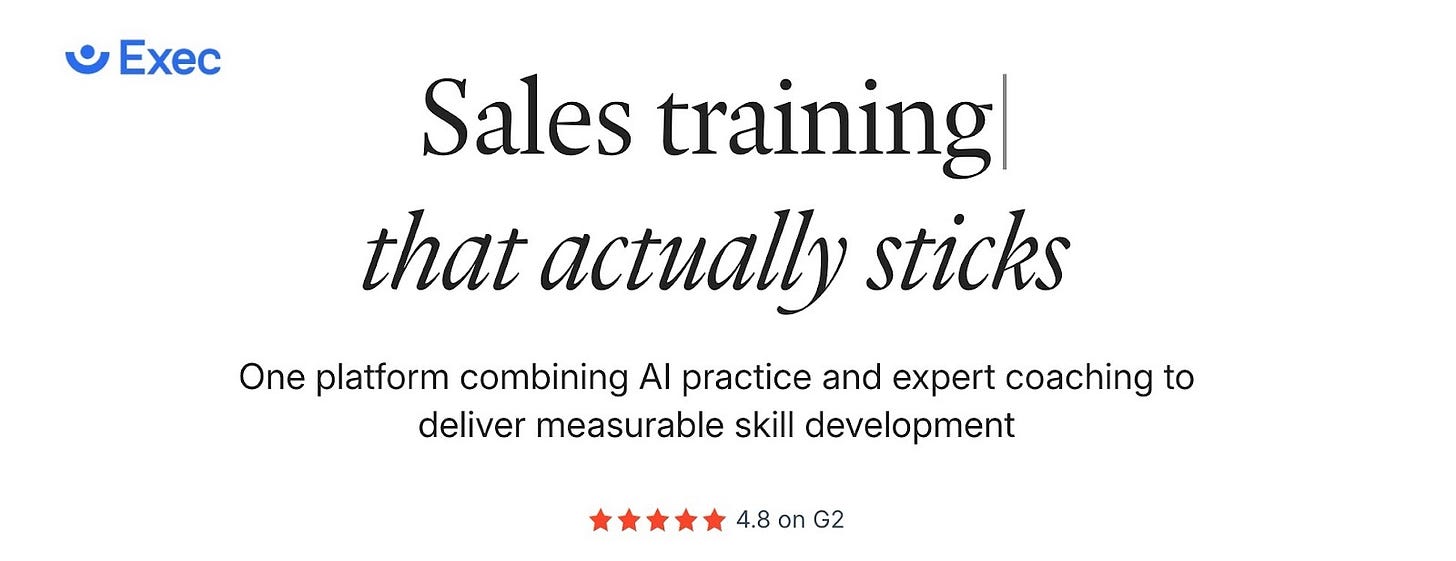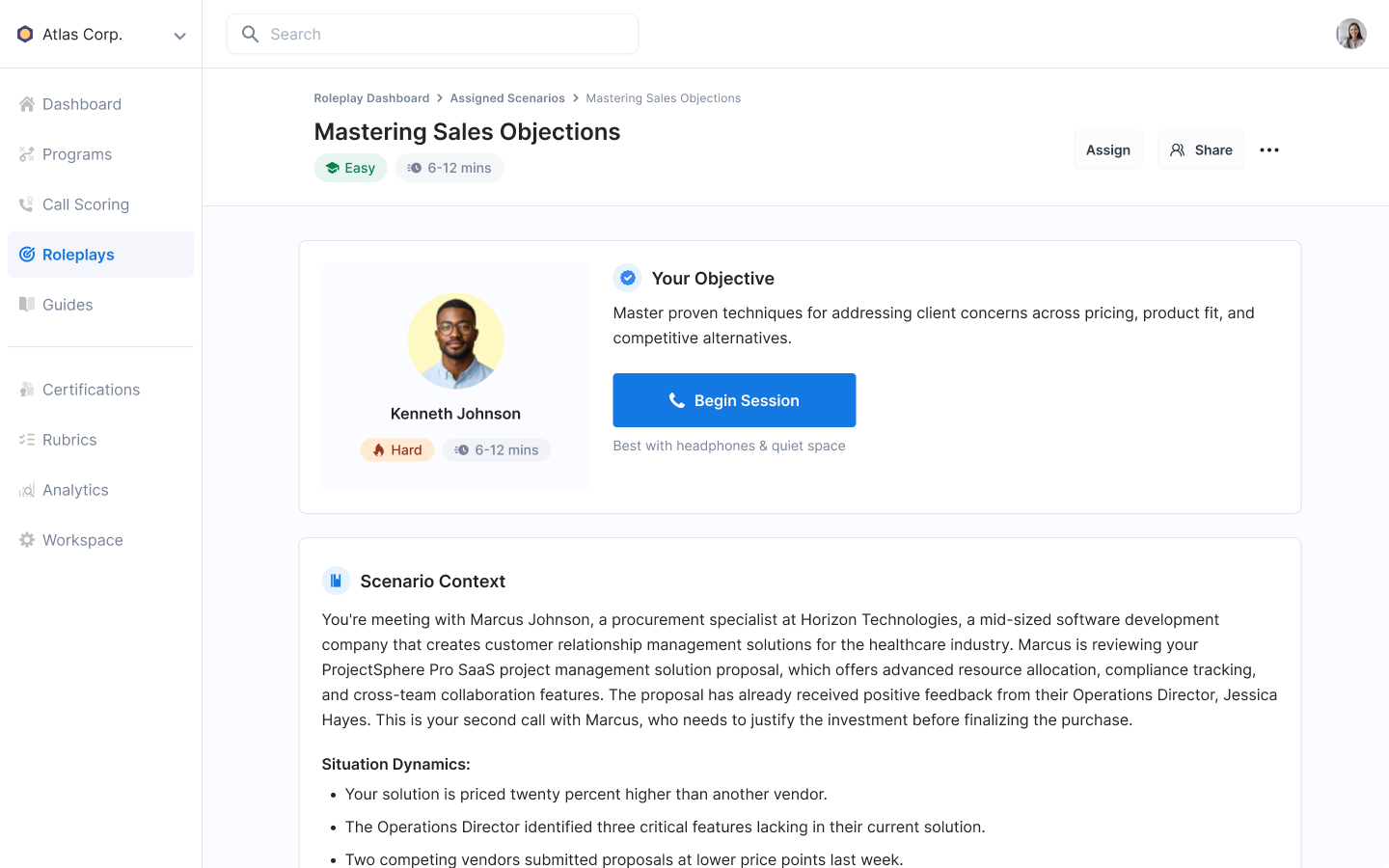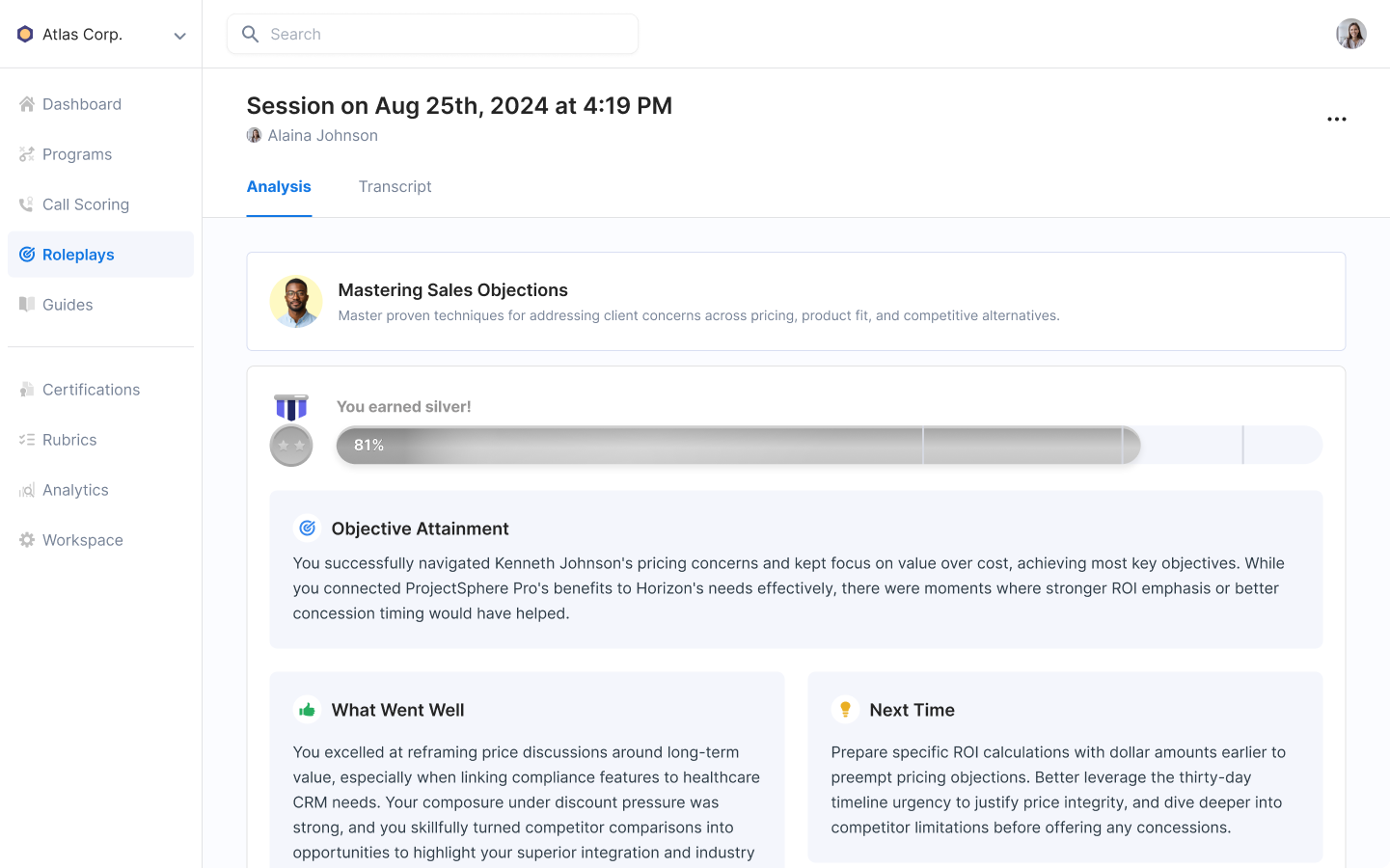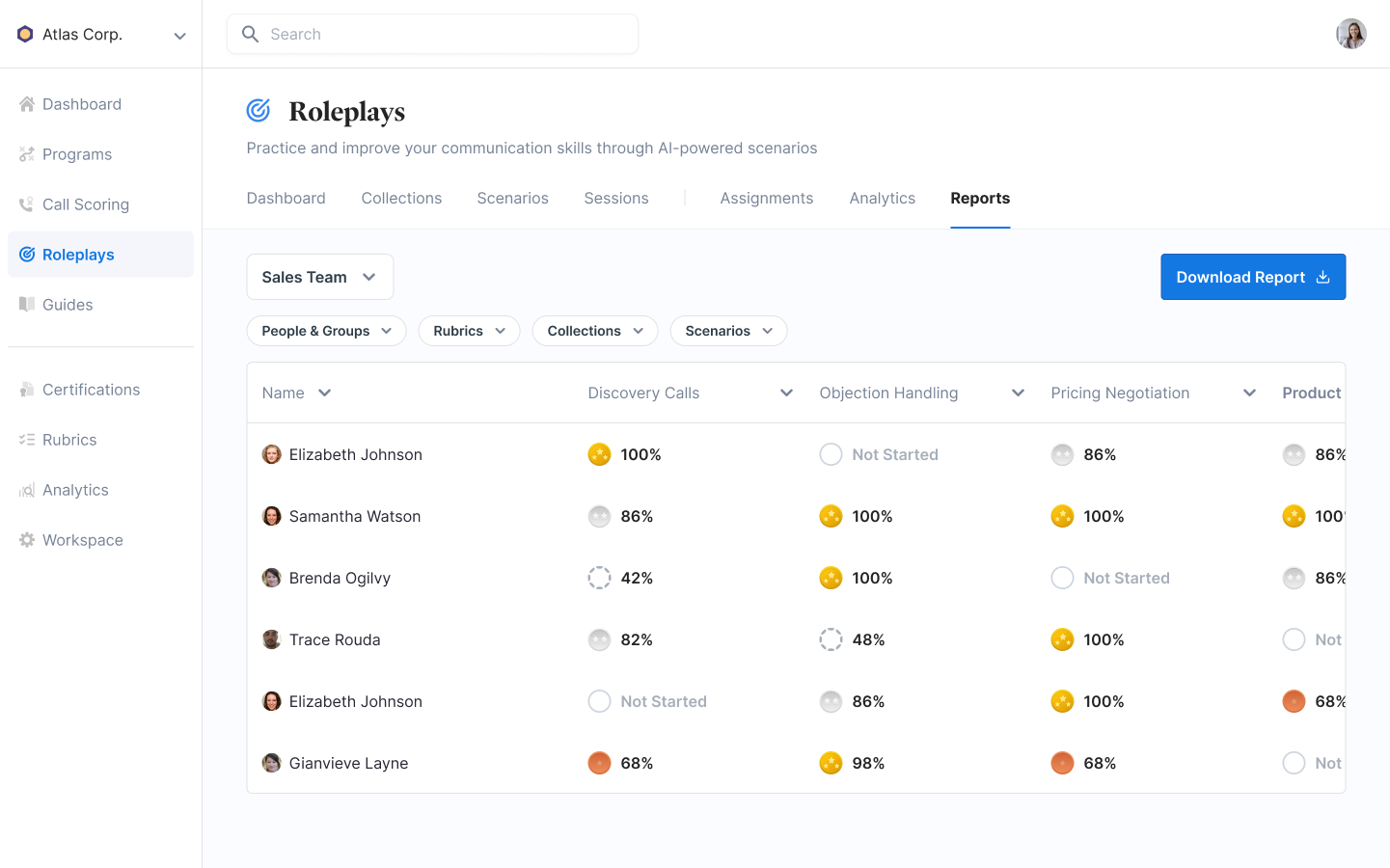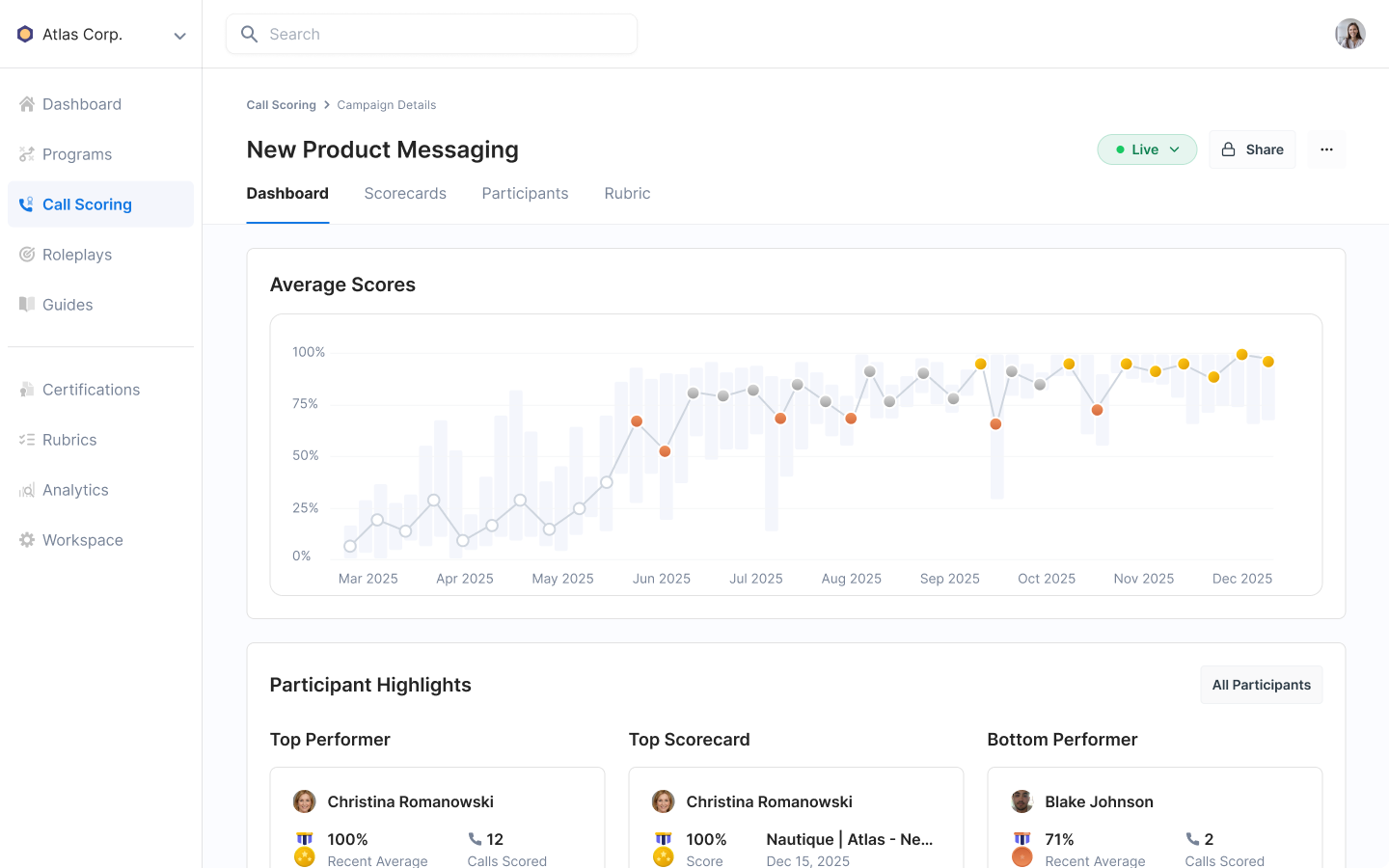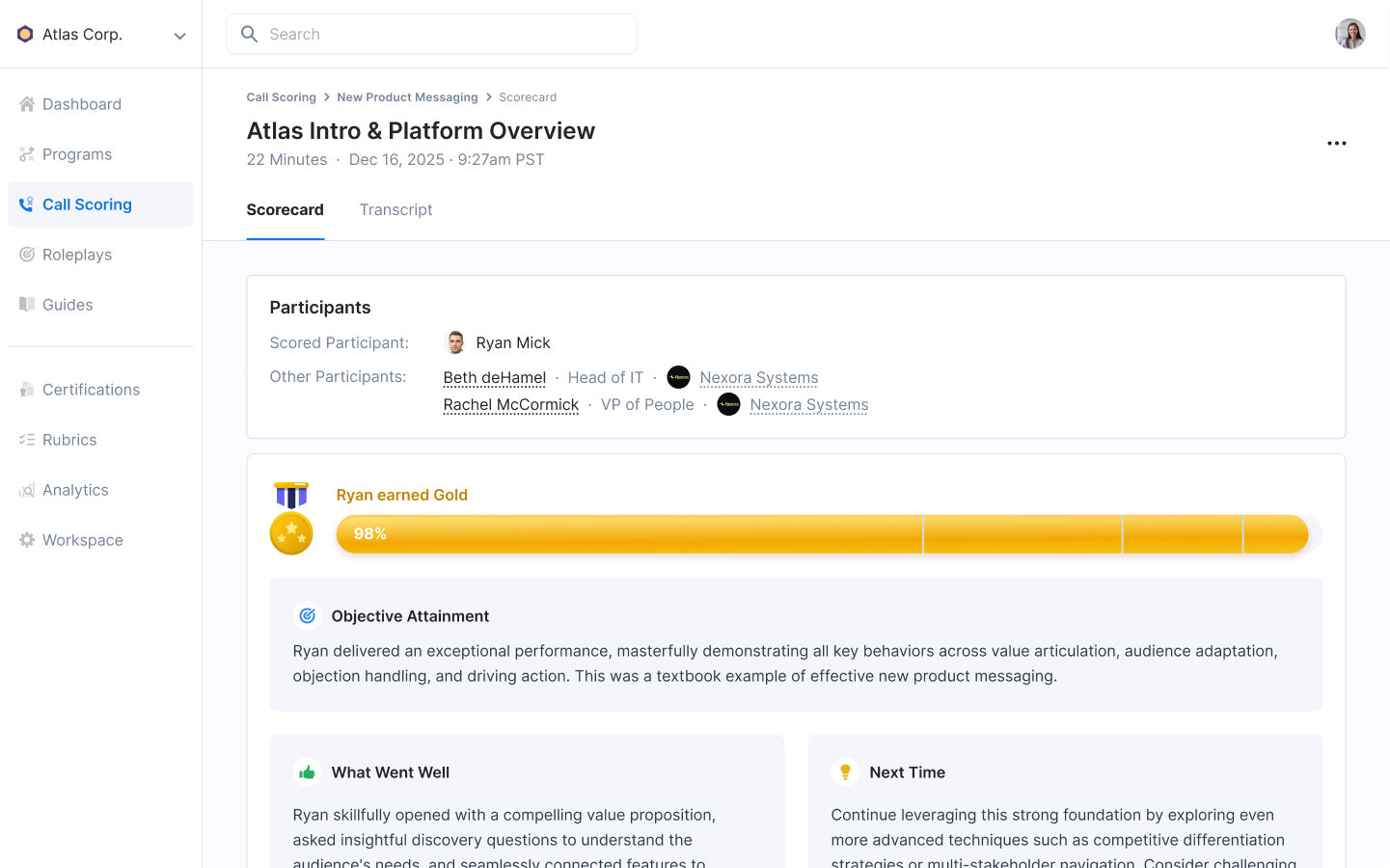Meet The Company Using AI Roleplays to Make Sales Training Stick
Exec.com x The Signal
If you were forwarded this newsletter, join 5,155 weekly readers—some of the smartest GTM founders and operators—by subscribing here:
Hey, y’all! 👋
I’m excited to explore today’s topic on how the best sales teams are using AI to improve their salespeople, not replace them.
The analogy that immediately comes to mind is a sports analogy. Sorry. But, here we are…
You wouldn't expect a pro basketball player to walk straight onto the court without warming up first. Even before warming up, they’re training relentlessly all week, and practicing specific moves/plays until they become second nature.
So why do we expect salespeople to jump straight into high-stakes calls without practice? Why do we send them into competitive situations armed only with PDFs and slide decks?
The best sellers already know this. They role-play constantly.
The problem is, traditional role-playing is broken. But, AI is finally fixing it.
And, this is exactly what Exec.com is focused on. They're using AI to re-imagine how sales teams practice and improve, by creating an AI role play platform for sales.
I met the co-founders, Nick and Sean, recently, and immediately had an “aha” moment. They're building the future of sales training, where AI increases human performance, instead of replacing it.
The idea of AI making humans better is great in theory, but I haven’t seen very many real-world examples. Which is why I was excited to write this sponsored deep dive on Exec.com and explore the problem space they’re building in.
(They’re offering The Signal readers an exclusive deal, so check that out if you'd like to test the product yourself!)
Here's what we cover in today's post:
Why Role-Playing Works
The Problems with Traditional Role-Play
How AI Solves the Role-Play Problem at Scale
Moving From Individual Practice to Organizational Intelligence
The Strategic Advantage of Systematic Practice
Looking Forward
Alright, let's get into it.
Why Role-Playing Works
There's something magical that happens when you move from watching to doing. Your brain switches from passive to active mode. Your stress levels rise. You have to think on your feet. You actually learn.
Role-playing works because it creates muscle memory for high-pressure situations. It's the difference between reading about objection handling and actually handling objections. Or the difference between memorizing a pitch and delivering it under pressure.
But the reality is, most role-playing doesn't happen, or when it does, it's not well-run.
The Problems with Traditional Role-Play
We're basically relying on managers to:
Carve out time to practice with reps (they don't have it)
Play the character well (most can't)
Score conversations fairly and consistently (impossible across teams)
Give feedback that's actually actionable (rarely happens)
Provide follow-up practice so feedback sticks (never happens)
The number of managers doing any role-plays is already low. And the number doing it well is close to zero. I’ve seen this first-hand.
Even when it happens, traditional role-playing has issues:
It doesn't scale (you need another person every single time)
Training happens in a vacuum (generic scenarios that don't match real situations)
It's not realistic (your manager playing “a skeptical IT director” isn't convincing anyone)
In the end, reps learn by burning through real leads and losing deals that could have been won. (This is 100% how I first learned to sell… don’t tell my CEO).
But, we have a magical new tool that we can leverage.
How AI Solves the Role-Play Problem at Scale
This is where Exec.com is focused — on building the best AI roleplay software for sales teams.
Reps can practice specific scenarios tailored to their actual buyer personas, whenever they want. The AI plays a convincing prospect – skeptical IT directors, budget-conscious CFOs, technical evaluators asking about integrations. Each with their own personality, pain points, and objections.
Here’s an example of what a rep might see inside a Roleplay:
It’s a perfect job for AI to do. At scale. And never get tired.
This level of detailed role-play drives three outcomes:
1) Ramp reps faster.
New hires don't need six months to get productive; they should learn in six weeks.
They can practice the exact conversations they'll have in their segment, with the specific personas they'll talk with, before they ever touch a real lead.
2) Practice without burning leads.
Reps can fail safely in practice instead of fumbling through real opportunities.
They can try different approaches, test new messaging, and build confidence without risking precious pipeline.
3) Custom scenarios that actually matter.
You're not practicing generic objection handling.
You're practicing your objections, your competitive situations, and your specific use cases. You can create and share scenarios customized to your sales process, complete with grading rubrics that ensure consistency across the team. You can now codify and scale a great manager’s hard-earned sales/training methodology, using AI.
Check out the level of detail and context on feedback that is possible:
I saw a demo where the AI played a skeptical procurement specialist raising concerns about security and integration (concerns pulled from actual lost deals recordings). The conversation felt real. Afterward, the rep received specific feedback on exact moments where they could have been more effective.
This isn't just better than reading battle cards. It's better than most human role-playing I've participated in. The AI has infinite patience, adapts instantly, and provides feedback that's both specific and measurable.
Moving From Individual Practice to Organizational Intelligence
The real magic happens when you zoom out from individual practice sessions. You can track trends, identify patterns, and quantify gaps in your team’s understanding. Wild.
Exec.com’s platform is now starting to analyze and score actual sales calls to identify patterns. It processes hundreds of conversations, clustering objections by type (eg: timing concerns, budget questions, competitive comparisons, etc).
Then it goes deeper. For each objection type, it analyzes which responses move deals forward and which don't. You see which reps struggle with which objections. You know exactly what to practice.
This creates a virtuous cycle:
Better reps generate more data
More data leads to better insights
Better insights drive more targeted practice
More effective practice creates better reps
And the cycle continues
When one rep discovers an effective way to handle a particular objection, that knowledge gets captured and turned into practice scenarios for everyone. Your best practices become embedded in the system, not lost when top performers get promoted.
The Strategic Advantage of Systematic Practice
"Practice doesn't make perfect. Practice makes permanent. So make sure you're practicing the right things in the right ways."
For sales teams, this means the difference between random improvement and exponential growth.
Small improvements in objection handling compound. Consistent practice with competitive positioning turns weak reps into confident closers. The key is making practice systematic and consistent.
This doesn’t mean that AI replaces managers either. Instead, it frees them to do what only humans can do. While AI handles the repetition, managers can focus on the "last mile" – the highly contextual, deeply human feedback that actually changes behavior.
You want to build a culture of continuous practice.
Where sales orgs make practice a habit, not an event (a la James Clear — “1% better every day”).
The old way was doing quarterly training sessions or annual batter card updates. This new way is doing quick practice runs before important calls throughout each day and continuous refinement each week based on what's actually working in the field. AI can close the feedback loop in a way that humans haven’t been able to do before, manually.
This is especially powerful for scaling organizations:
Product launches become more effective when reps practice positioning before prospects even hear about it
Competitive responses become coordinated when everyone practices the same proven strategies
New market entry happens faster when reps can practice segment-specific scenarios
The compound effect extends beyond individual performance to your entire go-to-market motion. You're building an organization that gets smarter over time, where knowledge compounds rather than disappears.
Looking Forward
We're still in the early days here. Most sales teams are still operating with training methods that haven't evolved in decades. But the early adopters of AI-powered practice will start to pull ahead.
For sales leaders building AI-native organizations, this use case of AI is clear to me — a lever to help you move beyond one-off information transfer to continuous skill development. This turns enablement from a cost center into a competitive advantage.
The future of sales training uses AI to increase human performance, not replace it.
Exec.com is winning in head-to-head deals against other roleplay providers. Buyers want the most realistic roleplay conversations, while also providing the most flexibility to design scenarios and scorecards that directly mirror their buyer personas, positioning, and sales methodologies like MEDDIC or SPIN. That combination—realistic convos plus alignment with how teams actually sell—is why Exec is winning.
→ Exclusive for The Signal Readers: Ready to transform your sales training with AI? Exec is offering The Signal readers (3) Free Roleplay User Licenses with unlimited roleplays to try (over $1,000 value)... Plus, you'll get priority access to the new Call Scoring beta with a pack of free call credits to get started: Claim Free Offer.
The team is legit, so if nothing else, you’ll learn about roleplay best practices and how you can improve your process today.
I’m excited to see how the product evolves in the coming years, to help up-level the sales profession.
That’s it for this week.
Thank you for your continued attention and trust – I do not take it for granted.
See you next time,
Brendan 🫡



